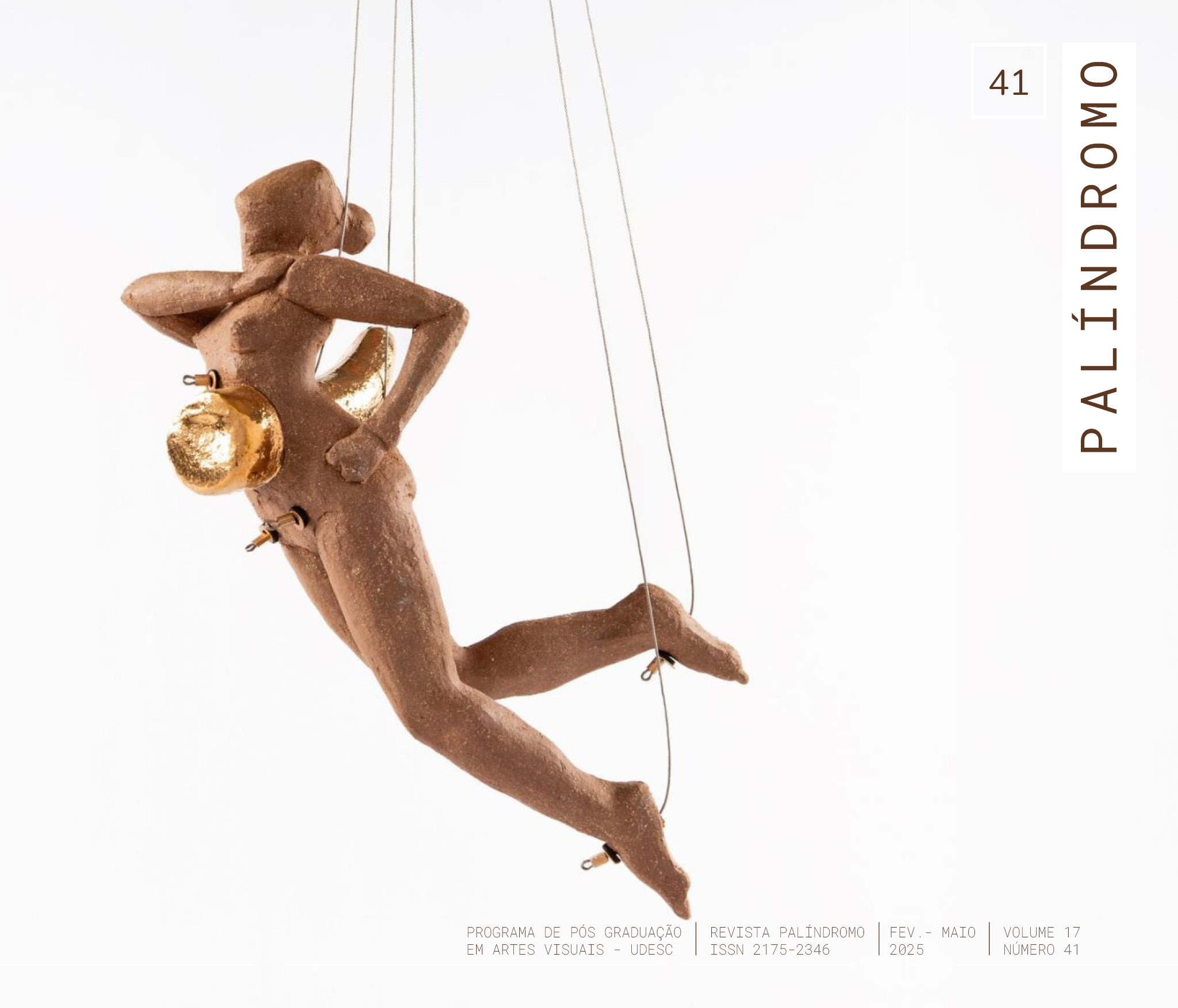Tradition und Widerspuch: Essay über Hartnäckgkeit der Schönheit
DOI:
https://doi.org/10.5965/2175234617412025e0002Palabras clave:
Schönheit, Tradition, WiderspuchResumen
Die Biographie der Schönheit hat einen langen Weg zurück, den wir aus der Sicht westlicher Geschichtlichkeit und Epistemologie (Wissenstheorie) rekonstruieren wollten. Es entstand in der Vorsokratische Zeit mit Vorstellungen, die Schönheit mit (Un-)Beständigkeit verbanden. Die geschwätzigste Aufzeichnung erscheint erstmals bei Platon (2021) und, abweichend oder ergänzend der Meister, bei Aristoteles (2008). Basierend auf dem zentralen Konzept des Logos lässt sich seitdem erkennen, dass Schönheit untrennbar mit der Idee von Abstraktion, Reinheit und Göttlichkeit verbunden ist. In der Renaissance (italienisch und nordisch) die Schönheit deutlicher begann zu zeigen, dass sie in ihrem Kern keine konsistenten Gegensätze fand, da sie sich dem Absoluten näherte. Der Barock, der seine mittelalterliche Macht wiedererlangt, fügt Dunkelheit und Hässlichkeit wieder ein, um das Schöne hervorzuheben (Caetano, 2024b). Die Romantik wiederum greift Aristoteles auf und bringt in Anlehnung an Kant (1998) eine Logik des Schönen (Baumgarten, 2007) mit, die jedoch allen Menschen vermittelt werden muss. In jedem Fall, Schönheit geht ein offensichtlichsten Manifestation, der Kunst, der notwendigen Kontextualisierung des Menschen in seinen historischen, kulturellen und anthropologischen Sphären voraus, wie die Psychoanalysen von Freud (2011) und Jung (2011a, 2011b) zeigen.
Descargas
Citas
ALIGHIERI, Dante. A divina comédia. Trad. Hernâni Donato. São Paulo: Abril Cultural, 1979.
ARAÚJO, Ricardo Torri de. Experiência mística e psicanálise. São Paulo: Edições Loyola, 2015
ARISTÓTELES. Arte poética. Trad. Maria Helena da Rocha Pereira. Lisboa: Fundação Calouste Gulbenkian, 2008.
BAUMGARTEN, A.G. Ästhetik. Lateinisch-deutsch. Hamburg: Felix Meiner, 2007.
CAETANO, Marcelo Moraes. Era de Aquário e sagrado feminino: entre Jung e as revelações do cristianismo oculto. Rio de Janeiro: Metanoia, 2024a.
CAETANO, Marcelo Moraes. Freud e psicanálise: primeiros contatos com a teoria e a prática clínica. Rio de Janeiro: Jaguatirica, 2022.
CAETANO, Marcelo Moraes. Platão e Aristóteles na terra do sol. Ouro Preto/Buenos Aires: Caravana/Caburé, 2024b.
CHILDE, Gordon Vere. The Aryans. London: Kegan Paul, Trench, Trubner & Co Ltda, 1926.
COSERIU, Eugenio. Teoria da linguagem e linguística geral. Tradução de Agostinho Dias Carneiro. Rio de Janeiro: Presença, Editora da Universidade de São Paulo, 1979.
DERRIDA, J. Gramatologia. Tradução de Renato Janine Ribeiro. 2. ed. - São Paulo: Perspectiva, 2008.
DURKHEIM, Emile. As regras do método sociológico. 13.ed. Trad. Eduardo Lúcio Nogueira. São Paulo: Nacional, 1987.
EAGLETON, Terry. Teoria da literatura: uma introdução. Trad. Waltensir Dutra. São Paulo: Martins Fontes, 2006.
ELIOT, Thomas Steams. Tradição e talento individual. In: Ensaios. Trad. Ivan Junqueira. São Paulo: Art, 1989. pp. 37-48.
FREUD, Sigmund. O mal-estar na civilização. Tradução de Paulo César de Souza. São Paulo: Companhia das Letras, 2011.
GARDINER, Alan. The theory of Speech and Language. 2. ed. Oxford, 1951.
HEGEL. Phänomenologie des Geistes. Berlin, Guttenberg Spiegel, 1807.
HJELMSLEV, Louis. Omkrig Sprogteoriens grundlagische. Copenhague: Akademish Verlag, 1943.
ISER, Wolfgang. O ato da leitura - uma teoria do efeito estético. Vol. 1. Trad. Johannes Kretschner. São Paulo: Ed. 34, 1996.
JUNG, Carl Gustav. Tipos psicológicos. In: Obras Completas de C. G. Jung, vol. VI. Trad. Dora Ferreira da Silva. Petrópolis: Vozes, 2011a.
JUNG, Carl Gustav. Símbolos da transformação. In: Obras Completas de C. G. Jung, vol. V. Trad. Dora Ferreira da Silva. Petrópolis: Vozes, 2011b.
KANT, Immanuel. Kritik der reinen Vernunft: Grundriss eines philosophischen Meisterwerks. Meiner, Hamburg: Verlag, 1998.
LEFEBVRE, Henri. Hegel, Marx, Nietzsche, ou le royaume des ombres. Madrid: Siglo Veintiuno, 1988.
NICOLESCU, Basarab. O Manifesto da Transdisciplinaridade. Trad. Lúcia Pereira de Souza. São Paulo: Triom, 1999.
PLATÃO. O Banquete. Tradução e notas de Irley F. Franco & JAA Torrano. Rio de Janeiro; São Paulo: Editora PUC-Rio; Edições Loyola, 2021.
WITTGENSTEIN, Ludwig. Philosophische Bemerkungen. Frankfurt. Suhrkamp, 1984.
Descargas
Publicado
Cómo citar
Número
Sección
Licencia
Derechos de autor 2025 Marcelo Moraes Caetano

Esta obra está bajo una licencia internacional Creative Commons Atribución 4.0.
DECLARAÇÃO DE DIREITOS AUTORAIS
a. Os artigos publicados pela revista são de uso gratuito, destinados a aplicações acadêmicas e não comerciais. Todos os direitos autorais são atribuídos à revista. Os artigos cujos autores são identificados representam a expressão do ponto de vista de seus autores e não a posição oficial da Revista Palíndromo. O (s) autor (es) compromete-se sempre que publicar material referente ao artigo publicado no Palíndromo mencionar esta publicação da seguinte forma:
Este artigo foi publicado originalmente pela revista Palíndromo em seu volume (coloque o volume), número (coloque o número) no ano de (coloque o ano) e pode ser acessado em: http://www.revistas.udesc.br/index.php/palindromo
b. Plágio, em todas as suas formas, constitui um comportamento antiético de publicação e é inaceitável. A revista Palíndromo utiliza o software iThenticate de controle de similaridade


